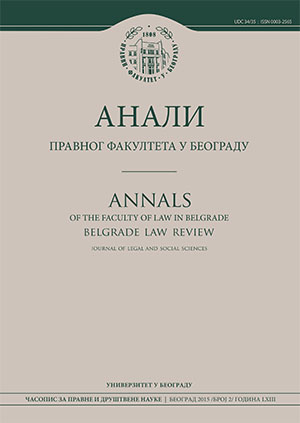ДА ЛИ СУ САСИ ИМАЛИ ПРИВИЛЕГИЈЕ У МЕШОВИТИМ СПОРОВИМА У СРЕДЊОВЕКОВНОЈ СРБИЈИ?
JUDICIAL PRIVILEGES OF SAXONS IN MIXED DISPUTES IN MEDIEVAL SERBIA
Author(s): Andreja KatančevićSubject(s): History of Law, Middle Ages
Published by: Правни факултет Универзитета у Београду
Keywords: Saxons; Medieval Serbian law; Jury; Medieval judiciary; Dusan’s Code;
Summary/Abstract: Based on the contemporary testimonies, wealth of the Serbian medieval kings was significantly increased by exploitation of number of precious metal mines that existed in their realm. Beginnings of the mine exploitation in medieval Serbia are related to the settlements of Saxon miners. Saxons were mining experts in medieval Europe who worked in distant mines far away from their homeland Saxony. They worked in this profitable mining business not only in Serbia, but also in Bohemia, Hungary (Transylvania and modern Slovakia) and Bosnia. The settlement of Saxons in Serbia occurred in time of the reign of King Stefan Uros I (1234–1276). Although without preserved sources which could directly support this thesis, Serbian historiography advocates that certain privileges were granted to the Roman Catholic Saxons at the time of their migration in orthodox Serbia. It appears that these privileges included self-government, freedom of religion, and mining concessions. Also judicial privileges are often mentioned in historiography especially the right of Saxons to one half of the members of their ethnicity in judicial collegium and jury in the case of a dispute with member of another ethic group. This paper attempts to test the thesis related to composition of mixed courts and juries by applying historical method, and linguistic, systemic and historical interpretation of the sources such as King’s Charters issued to Dubrovnik, Dusan’s Code and Despot Stefan’s Mining Code.
Journal: Анали Правног факултета у Београду
- Issue Year: 63/2015
- Issue No: 2
- Page Range: 107-118
- Page Count: 12
- Language: Serbian

